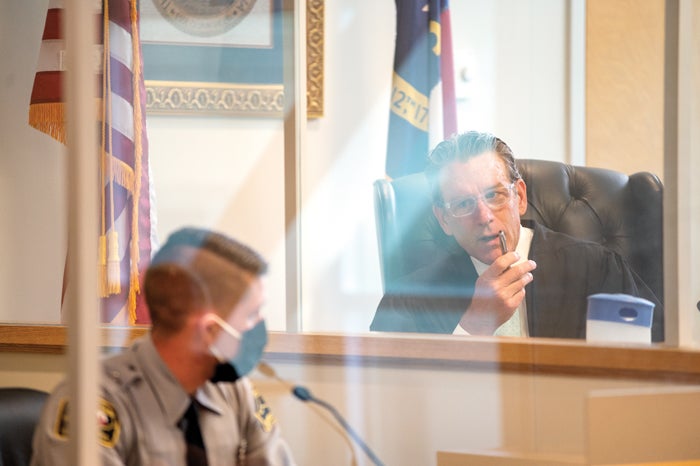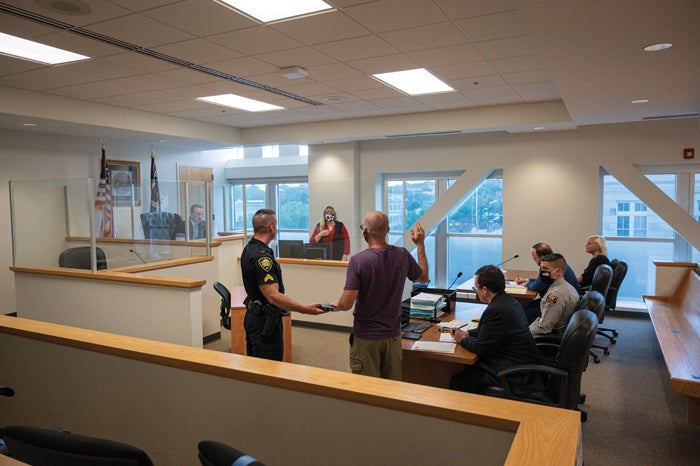Named ‘county of concern,’ Rowan courts put extra attention on DWI cases
Published 12:10 am Sunday, May 23, 2021

- Salisbury Post file photo - Chief District Court Judge Charlie Brown talks to state Trooper J. Simmons during a DWI trial in May. Brown scheduled an entire week of DWI-focused court sessions because of a backlog identified by the state.
By Josh Bergeron and Ben Stansell
news@salisburypost.com
SALISBURY — After finding Rowan among seven “counties of concern,” local court officials last week filled up an extra court session with driving while impaired cases.
The “county of concern” moniker signifies some counties have been impacted by changes during COVID-19 more severely than others, said Andrew Heath, director of the N.C. Administrative Office of the Courts. Along with Cleveland, Cabarrus, Duplin, Wayne, Lenoir and Mecklenburg, Rowan County found itself named in an N.C. Judicial Branch report as having a concerning DWI case backlog because of its size and percentage of total cases. The report found Rowan County with 473 total pending DWI cases as of Dec. 31 and 160, or about 34%, classified as being part of the COVID-19 backlog.
Some court matters were never delayed, including abuse and neglect cases, but DWI trials were among those put off for a later date. Chief District Court Judge Charlie Brown said the cases are among the most complex litigation types and can involve a large number of people in one room if there’s a jury. Now, maximum capacity and social distancing guidelines have reduced sizes of dockets in general. Before COVID-19, it wasn’t unusual for people to pack themselves shoulder-to-shoulder in a district courtroom.
“It used to be an everyday occurrence to have standing room only and to have people summoned from outside in the hallway,” Brown said.

Josh Bergeron / Salisbury Post – A witness is sworn in during a DWI trial Wednesday in Rowan County District Court.
To have a legal matter, criminal or civil, pending for a long time undermines public trust and confidence in the Judicial Branch, said Chief Justice Paul Newby. Some cases heard last week in Rowan County District Court were two years old.
“Justice delayed is justice denied,” Newby told the Post. “We have to address this as quickly as we can.”
By scheduling a special weeklong session for DWI cases, Brown said he hoped to reduce the number of pending DWI cases and put extra attention on the backlog. He expected to complete about 45 cases last week. Newby said he and Heath also are working to identify emergency recall judges to send into areas with backlogs.
“DWI is a crime that needs to be investigated, enforced and justice needs to be rendered,” Brown said. “There are extreme life and death consequences to driving while impaired. That we have a problem with resolving DWI cases mean we’re going to act.”
In addition to the DWI report, the N.C. Judicial Branch issued findings on backlogs in felony and misdemeanor cases. While Rowan County didn’t make the list for concerning felony or misdemeanor backlogs, the reports found 391 COVID-19 cases, or 17.6% of the total, in Rowan’s felony COVID-19 backlog and no cases considered to be in the misdemeanor appeals COVID-19 backlog.
Cabarrus received the “county of concern” name for felony cases in addition to DWIs. There, the N.C. Judicial Branch says 638 felony cases, or 32.2% of the total, and 376 pending DWI cases, or 36.7% of the total are part of a COVID-19 backlog.
No other neighboring counties were found with a concerning backlog.
For people who find themselves in a backlog, Heath said North Carolina courts are working diligently “to fulfill our constitutional mandate that all courts shall remain open and that justice shall be rendered without delay.” Heath said the Administrative Office of the Courts is allowing local leadership to tailor policies for their specific needs.
“These are challenging circumstances and we are committing resources to ensure that every case is appropriately resolved,” Heath said.


